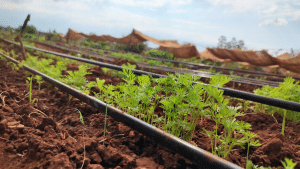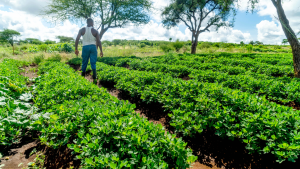At Ambokili Farm, the empowerment of women transcends mere rhetoric. Here are 6 ways in which we continiously empower women to bridge the gender equality gap:
Decent Standards of living
With over 17 women employed, the Ambokili Farm has become more than just a workplace; it’s a beacon of hope for these women. No longer constrained by financial dependence, they now enjoy access to basic needs, witnessing a transformation in their daily lives, it has been evident in the improvement of the quality of their dress and grooming.
In the Maasai community, where livestock symbolizes wealth, the acquisition of cattle is traditionally reserved for men. However, Ambokili Farm has challenged these entrenched gender norms. Faith, a female worker at Ambokili Farm, is expectant. Remarkably, to celebrate the birth of her baby, she planned to slaughter a goat. Since she has a source of income, she was able to plan her finances appropriately and acquired a goat.
Primarily, the responsibility of acquiring cattle rested on men, reflecting societal disparities in access to opportunities and income. Yet, Ambokili Farm serves as a catalyst for change, fostering a paradigm shift towards gender equality in financial matters.
Moreover, the farm’s commitment to superior working conditions translates into tangible benefits for its female workforce. Allowing them to invest in themselves and their families. For instance, Ambokili Farm pays 75% more than the farms in and around Kimana for the same number of working hours. We also have friendlier working hours since our employees get to go on a 2 and ½ hour lunch break from 1230h to 1500h when the sun is extremely hot. This gives them time to rest, protects them from the harsh UV rays and allows them to spend more time at home and with their families.
Furthermore, the adoption of organic farming practices equips female employees with valuable skills applicable beyond the farm’s confines. Application of the organic practices they learn at the Farm has enabled them reap investments on their farms. Faith, one of our employees, laughs and says, “I planted late and did not use a lot of effort on my farm.” “Yet, I was able to harvest 1 sack of maize,” she explains in disbelief.
Over time, we’ve witnessed a growing interest in the community members to learn about organic practices and employ them in their farms. Our workers ask a lot of questions so that they may learn and employ them in their lives to benefit themselves and their families.
Ending Structural discrimination
Despite social roles dictating that men work and provide for their families while women be involved in unpaid care, Ambokili Farm has intentionally employed more women than men.
Ambokili Farm employs more women as they’re better at managing their finances, providing for their families and maintaining peace in the community. We’ve experienced men neglecting their families’ financial needs even after being paid. They choose to go on drinking bouts and end up using all their income on drugs and alcohol. This then causes domestic fights and disruption of peace in the community. However, women have been more responsible and have invested their income in themselves and their families.
Incidences of male employees squandering earnings on vices, precipitating domestic discord, underscore the wisdom of the farm’s gender-inclusive hiring practices.
Work-Life Balance
All the women we work with at the Farm come from the surrounding Maasai community. For the predominantly Maasai female workforce, achieving work-life balance was historically elusive. Juggling farm duties with unpaid care responsibilities left them hurried and distracted.
Before introduction of the long lunchbreak from 1230h to 1500h, most of the women working with us were unsettle and often had divided attention. This is because their minds were on the unpaid care they needed to do at home and being at the Farm all day did not allow them to complete their domestic tasks. For instance, when it rained, they needed to store their harvests properly or unhung their clothes that had been left outside to sun dry or open the door for their children who might have been back from school. The undivided attention affected their productivity. Since we introduced the long lunch break, they have been able to concentrate better as they can comfortable complete their paid and unpaid duties.
Decent Work and Access to Economic Resources
We’re able to provide our farm employees with decent work by paying fare wages which are 75% more than what they’d get were they to work in other farms. We’re also allowing them to go home and be indoors for 2 and ½ hours where they can rest, spend time with their families or complete their domestic duties. Them being indoors also protects them from the UV rays of the sun at that time when the weather conditions are very harsh.
Additionally, we give zero-interest loans to our employees. They mostly use it to provide formal education for their children and for day-to-day living.
Access to Financial Services
Recognising the pivotal role of financial inclusion in fostering economic empowerment of women, Ambokili Farm facilitates access to formal banking services for its employees. From educational initiatives that educate our female workers on access, use and benefits of financial services to advocacy about financial inclusion, we encourage them to utilise banking facilities, enhance financial literacy and financial independence.
Access to Formal Education
In many traditional societies, including the Maasai community, women face systemic barriers to education, perpetuating cycles of poverty and gender inequality. Ambokili Farm serves as a catalyst for change, providing not only employment but also pathways to education for women and their children. By breaking the shackles of early marriage and financial constraints, these women are rewriting their destinies and paving the way for future generations to thrive.
Most of the women in the Maasai community are married at an early age. Hence, they may not complete their high school education either due to financial reasons or early marriage unlike their male counterparts. For example, only 2 of our female workers at the farm have completed their high school education. This limits their access to income opportunities and makes it difficult for them to have a formal source of revenue.
Ambokili Farm provides a source of income for the women in the community. Together with the zero-interest loans they have access to, these women are breaking the cycle by giving their children education.
In conclusion, Ambokili Farm’s holistic approach to addressing the gender equality gap sets a commendable precedent. By prioritising decent standards of living, challenging structural discrimination, promoting work-life balance, providing economic resources, and facilitating access to financial services and education, the Farm not only empowers its female workforce but also catalyses broader societal change. Through such concerted efforts, the seeds of gender equality are sown, ensuring a more equitable and prosperous future for all.







2 Responses
Hello there, just became aware of your blog through Google,
and found that it is really informative. I’m gonna watch out for brussels.
I will appreciate if you continue this in future.
Numerous people will be benefited from your writing.
Cheers! Escape rooms hub
Hello. Thank you for your kind words and rest assured we will be continuing with this. Feel free and continue to support Ambokili Farm! All help and support goes a long way in developing the communities we work in and with.